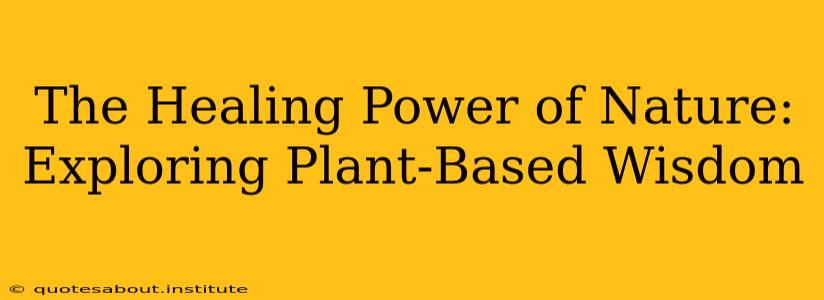For centuries, humans have harnessed the healing power of nature, relying on plants for medicinal purposes long before the advent of modern pharmaceuticals. From ancient Ayurvedic practices to traditional Chinese medicine, plant-based remedies have played, and continue to play, a vital role in healthcare systems worldwide. This exploration delves into the fascinating world of plant-based wisdom, examining the science behind their healing properties and the enduring relevance of this ancient knowledge.
What are the benefits of plant-based medicine?
Plant-based medicine offers a multitude of benefits, many of which are rooted in the complex chemical compounds found within plants. These compounds, often called phytochemicals, possess a wide array of biological activities, including antioxidant, anti-inflammatory, and antimicrobial properties. Some key benefits include:
- Reduced Inflammation: Many plants contain compounds that effectively reduce inflammation throughout the body, contributing to the prevention and management of chronic diseases. Examples include turmeric (curcumin), ginger, and boswellia.
- Improved Immune Function: Certain plants boost the immune system by stimulating the production of immune cells or by directly combating pathogens. Echinacea and elderberry are well-known examples of plants used to support immune health.
- Antioxidant Protection: Plants are rich sources of antioxidants, which help protect the body against damage caused by free radicals. This protection is crucial in preventing cell damage and reducing the risk of chronic diseases like cancer and heart disease. Berries, dark chocolate, and green tea are excellent sources of antioxidants.
- Natural Pain Relief: Some plants possess analgesic properties, providing natural pain relief without the side effects often associated with synthetic pain medications. Willow bark, for example, contains salicin, a precursor to aspirin.
- Mental Wellness Support: Certain plants have been traditionally used to support mental well-being, with some exhibiting anxiolytic or antidepressant effects. Examples include St. John's Wort and chamomile.
It's crucial to remember that while these plants offer potential benefits, they are not a substitute for professional medical advice. Always consult with a healthcare professional before using plant-based remedies, especially if you have pre-existing health conditions or are taking other medications.
Are there any risks associated with plant-based medicine?
While generally safe when used appropriately, plant-based medicines do carry some potential risks. These risks can include:
- Drug Interactions: Some plant-based remedies can interact negatively with prescription medications. It's vital to disclose all supplements and herbal remedies to your doctor to avoid harmful interactions.
- Allergic Reactions: Individuals can develop allergic reactions to certain plants, just as they can to any substance. A patch test is recommended before applying topical herbal remedies.
- Contamination: Herbal supplements are not always subject to the same rigorous quality control as pharmaceuticals. This increases the risk of contamination with heavy metals, pesticides, or other harmful substances. Choose reputable brands that conduct third-party testing.
- Dosage Concerns: Incorrect dosage can lead to adverse effects. Always follow recommended dosage instructions and consult with a healthcare professional to determine the appropriate dosage for your individual needs.
- Lack of Standardization: The standardization of herbal remedies can vary, meaning the concentration of active compounds may differ between products. This can affect the efficacy and safety of the remedy.
How do I choose safe and effective plant-based remedies?
Choosing safe and effective plant-based remedies requires careful consideration. Here's what you should do:
- Consult a qualified healthcare professional: Before using any plant-based remedy, especially for treating a specific condition, consult with a doctor or other qualified healthcare professional. They can help determine if it's appropriate for you and advise on appropriate dosage and potential interactions.
- Research reputable suppliers: Choose reputable suppliers who conduct third-party testing to ensure the purity and potency of their products. Look for certifications and transparency in their manufacturing processes.
- Start with a low dose: Begin with a low dose of any plant-based remedy to assess your tolerance and avoid potential adverse effects.
- Monitor for side effects: Pay attention to your body's response to the remedy. If you experience any adverse effects, discontinue use and consult with your healthcare provider.
- Understand the limitations: Remember that plant-based remedies are not a cure-all and may not be effective for all conditions. They should be used as complementary therapies, not replacements for conventional medical treatments.
What are some examples of plants used in traditional medicine?
Numerous plants have been used in traditional medicine systems globally. Examples include:
- Ginseng: Used in Traditional Chinese Medicine to enhance energy levels and boost immunity.
- Echinacea: Traditionally used by Native Americans and now widely used to support immune function.
- Turmeric: Used in Ayurvedic medicine and increasingly popular for its anti-inflammatory properties.
- Chamomile: Known for its calming and soothing effects, often used to alleviate anxiety and promote sleep.
- St. John's Wort: Traditionally used to treat mild to moderate depression.
Is plant-based medicine backed by scientific evidence?
While many traditional plant-based remedies have been used for centuries, rigorous scientific research is ongoing to validate their efficacy and safety. Many studies are showing promising results, confirming the therapeutic potential of various plant compounds. However, more research is needed to fully understand the mechanisms of action and potential side effects for many plant-based remedies. Always consult a qualified healthcare professional to discuss the evidence base for any specific plant-based remedy you are considering.
This exploration of plant-based wisdom highlights the significant role nature plays in promoting health and well-being. While modern medicine offers valuable treatments, the enduring legacy of plant-based remedies reminds us of the rich tapestry of healing knowledge that nature provides. Remember always to consult with a healthcare professional before using any plant-based remedy to ensure its safe and effective use.

